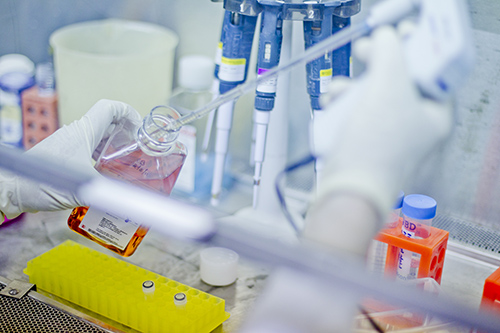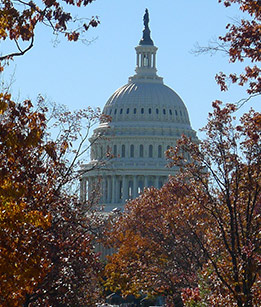Our Work
Research

amfAR’s top research priority is the pursuit of a cure for HIV/AIDS. In 2014 we launched the Countdown to a Cure for AIDS, a research initiative aimed at developing the scientific basis of a cure by the end of 2020. To that end, we initiated a multi-year $100 million investment strategy designed to advance a range of scientific approaches with the potential to achieve HIV remission or cure.
The cornerstone of the strategy is the amfAR Institute for HIV Cure Research, established in 2016 with a five-year $20 million grant to the University of California, San Francisco. Additional grants and fellowships support teams of scientists worldwide pursuing innovative cure-focused research strategies. Many of these are supported through the amfAR Research Consortium on HIV Eradication, or ARCHE, which was launched in 2010 to accelerate the pace of HIV cure research.
Additionally, amfAR’s Mathilde Krim Fellowships in Basic Biomedical Research support the development of outstanding young researchers who have demonstrated a commitment to preventing, treating, and curing HIV/AIDS. In 2017, amfAR-funded researchers generated 52 scientific papers in leading peer-reviewed journals.
TREAT Asia
 Established in 2001, TREAT Asia (Therapeutics Research, Education, and AIDS Training in Asia) is a collaborative network of clinics, hospitals, research institutions, and civil society that is working to ensure the safe and effective delivery of HIV treatments to adults and children across the Asia-Pacific through research, education and advocacy. The network currently encompasses 20 pediatric and 21 adult sites throughout the region.
Established in 2001, TREAT Asia (Therapeutics Research, Education, and AIDS Training in Asia) is a collaborative network of clinics, hospitals, research institutions, and civil society that is working to ensure the safe and effective delivery of HIV treatments to adults and children across the Asia-Pacific through research, education and advocacy. The network currently encompasses 20 pediatric and 21 adult sites throughout the region.
TREAT Asia’s unique capacity to bring together researchers, doctors, activists, advocates, and policymakers plays an important role in the region’s response to HIV, and it has become a model for regional collaboration on HIV/AIDS. Its members study optimal approaches to treating HIV, common co-infections, and comorbid conditions among adults and children, particularly in resource-limited settings.
It regularly hosts workshops and develops and distributes educational materials to provide clinicians and community advocates with the knowledge they need to better address the epidemic within their own country contexts. TREAT Asia also plays a key advocacy role in the region, using data gathered through the network and its research to make the case for evidence-based HIV-related policy and programming.
Public Policy
 amfAR is a leading advocate of continued robust U.S. support for the global HIV response through critical programs such as PEPFAR—the U.S. President’s Emergency Plan for AIDS Relief—and the Global Fund to Fight AIDS, Tuberculosis and Malaria. amfAR undertakes research on strategic and programmatic targets and progress reporting to ensure that programs are delivering services to all populations in need, and maintains a database of funding and target data from the PEPFAR program.
amfAR is a leading advocate of continued robust U.S. support for the global HIV response through critical programs such as PEPFAR—the U.S. President’s Emergency Plan for AIDS Relief—and the Global Fund to Fight AIDS, Tuberculosis and Malaria. amfAR undertakes research on strategic and programmatic targets and progress reporting to ensure that programs are delivering services to all populations in need, and maintains a database of funding and target data from the PEPFAR program.
amfAR is committed to reducing the risk of acquiring HIV and hepatitis C through the sharing of contaminated needles/syringes and advocates harm reduction policies to improve outcomes for people who inject drugs. amfAR maintains a database of epidemiologic, policy, and funding data on opioid use, HIV, and hepatitis C.
amfAR also advocates expanded access to HIV prevention and treatment services for gay men, other men who have sex with men, transgender individuals, sex workers, and people who inject drugs worldwide, and works to reduce the stigma and discrimination that make these populations more vulnerable to HIV infection and inhibit equal access to care.
And amfAR advocates a strong commitment to HIV research and for funding for the National Institutes for Health and increased access to affordable medicines for both HIV and HCV, and works to reduce the socioeconomic and cultural factors that make women and girls vulnerable to acquiring HIV and to increase access to HIV services for women and girls.
Public Information

amfAR disseminates information on important AIDS-related research, treatment, prevention, and policy issues to diverse audiences worldwide in order to increase awareness and understanding of HIV/AIDS. The Foundation publishes a wide range of educational materials including its biannual newsletter, Innovations; the TREAT Asia Report; a monthly e-mail newsletter; and program reports and updates on important HIV/AIDS issues.
amfAR works with the media to raise the public profile of HIV/AIDS, conducts public service advertising campaigns, and provides expert commentary on HIV/AIDS-related issues. Articles and reports involving amfAR were carried in numerous media outlets in 2017, including The New York Times, The Washington Post, Los Angeles Times, Forbes, The Hill, The Advocate, Huffington Post, USA Today, New York Magazine, Harper’s Bazaar, Mother Jones, the South China Morning Post, Healthday News, Al Jazeera, Reuters, and UPI.
amfAR also has a lively presence on social media. We regularly add content to our Facebook page, live tweet from events, and post images on our Instagram page. amfAR has 74,000 likes on Facebook, 43,000 Twitter followers, and close to 150,000 Instagram followers.